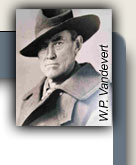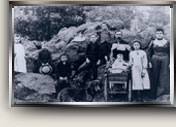A 1910 Camping Trip with the Vandeverts
Sunday, July 10, 1910
We have had a good ride and we are now at Vandevert’s, a big log house set down in a great grassy prairie, just like the meadows at home. Little River flows through this grassy flower-bedecked spot
But it’s hot – beastly so. We all sit around on the porch and those of us who are not too sticky and who are polite, talk and talk but the rest of us poor things wilt. The Vandeverts are typically Southern in regard to hospitality and there is open house for everybody.
Monday, July 11
I am up at five – will you believe it? All is hustle and bustle her for we are now on our way – real camping. There is quite a procession of us – the grub and the bed wagon, a hack (small 4-wheel carriage- ed.) with Mrs. Wilson, Claude (Claude Vandevert, age 18 – ed.), Mr. Brock, Pauline, and I in and then six girls come riding horseback, looking very picturesque in their riding togs and their bandana be-decked straw hats. It is just like a western story to me. (Ann Markel grew up in Illinois –ed.).
We stop at the fish traps and rest here. Mr. Triplett shows us about a dozen beauties – Dolly Vardens – and presents us with one for supper.
There be several mishaps. Claude, not quite sure of the road, leads us into several interesting sidepaths; we lose the horseback party, which goes on a mad chase five miles up the mountain and then tries to make us believe they chased a bear; Veda even smells the track to see if it is fresh; Cornelia gets rapped smartly on the head by an overhanging bought, etc., but it is a happy party that finally winds up at the “Wicky-Ups” so called because the Indians left standing their tent poles. (about 20 miles from Vandevert Ranch – ed.)
An old log cabin under the pines and below, the Deschtues, hardly to be recognized as the wild Deschutes which plunges and dashes so madly through Bend. This Deschutes still and deep and treacherous – off shoe a direct ten feet. But it is so beautiful.
Cooking supper now. The grub is thick with dust but we are savages now, primitive people who have never seen a tablecloth or heard of laundry and the primitives people’s appetites are truly immense. Article after article of food is safely tucked away and yet the hole is there. Will Vandevert (Thomas William Vandevert, age 26) and Mr. Brock cook regular camp bread in a Dutch oven, delicious stuff and we sling it at each other and fairly gobble it whole.
We are now stretched out under the tall straight pines and as we look up into them and the bright stars above, the Eternal Love seems very near—nearer to me than ever before. We have a camp fire around which our four ungainly hounds lie – beasts which wail dismally at ever unusual noise and which I finally dispose of in my dreams by cutting into long strips and burn as fuel.
It is a long time, however, before the dream stage comes, for whoever found eight girls who could go to sleep when they ought to. Marion has a fitful burst of song, Grace one of coughing, and the rest of us giggling.
Tuesday, July 12
But to continue. At 4:30 the men arouse themselves and get breakfast. We girls dress behind a canvas stretched between us and the cooks and we are done ready to dig into the ham, coffee, bread, etc. At seven we were on our way to Davis Lake. (about ten miles from the “Wicky-ups – ed.)
The beauties of the country through which we pass! I wish I might make you see and feel it as I see it—the long stretches, the high lava rock ledges on one side as we approach the lake and the green forest on the other. We stop and a tiny spring hidden away in the foot of the rocks and taste the ice cold water. The whole ledge sends forth a cool breath and we believe there are ice caves hidden away in its dark and rocky bosom.
And now the lake appears—calm and clear and cool—surrounded by deeply wooded mountains which crowd around as if to see their own majestic faces in the lake at their feet. All monotony of outline broken—first a long sloping giant, then a fat roly-poly dwarf, then a patriarchal hoary-headed monster who towers above the rest and whose snowy bearded face smiles benignly down upon his huge children clustered about him. The very bigness and peacefulness creeps into our souls and all our trivial cares and troubles fall away and we are now primitive people with never a care or a thought beyond the Happy Present.
And we live in accordance with our primitive mood. Our beds are made up under the low spreading hemlocks. Our wigwam where we dress is close by. The Indian Chief, big and strong, hews wood and builds us a table—the Dutch ovens and frying pans are scattered out on the trees and we are settled and ready to live the SIMPLE LIFE, spelled with happy capitals throughout. And it is a real prairie with grass over a foot high where we live and this Prairie Girl loves it all, for ti brings with its greenness and freshness a breath of her own dear Illinois. It is the first time she has lived in a meadowland for a year.
And tonight we sleep under the hemlocks and gaze up once more into the bright stars and now also upon the pine-covered hills on the other side of the lake.
There are other uncivilized people near us—a sheep herder and two young sheep owners. The sheep sleep not far away from us—2,300 of them—that bleat and call to us until every mother has found her baby and then they lie down peacefully in the moonlight.
Tuesday, July 12 (sic)
A rather quiet day in camp but evening brings its excitement. Joe, one of the sheep men comes riding up, spurring his horse furiously, our hounds howl wildly at him, and he shoots as he passes the camp. We girls are some startled to state it mildly. Is he drunk? Is he enraged at our dogs? Excitement is rife. No—he had treed a bear and comes back for more ammunition. On his return from the mountains he shows us a tiny bear cub which has been shot through the head. Such a wee one. We can see its poor mother roaming the woods calling for her baby and we feel sorry, even though it is exciting. Veda, the lucky lady, gets the cub and its skin is now drying on a tree nearby.
Wednesday, July 13
I said we felt sorry for the poor mother bear and yet, inconsistently, we start off early on a search of said mother. Well, if her heart is broken over the loss of her child, it is only human to put her out of her misery. There are four fierce mannish-looking girls—Zezee Zee Zum (Veda), Red Wing (Cornelia), Tommy (Kathryn Grace Vandevert – 20 years old), and Forgotten (Ann Markel). Tommy, however, is the only one with a gun, which she surely knows how to use. Grace, big and comfortable and competent is truly typically Western. The Indian Chief precedes his band of squaws and away we canter off to the mountains, through the deep forest, past a sparkling brook, up, up, following the Blazed Trail. Silence falls upon our party—it seems that the immensity and grandeur produces silence. Probably we think our thoughts too deep, too intimate, to put into words.
But look! The Indian Chief is busy looking at fresh tracks. We have reached the place where the cub was shot. Our hounds startle the surrounding hills with their deep baying and the hills call back, as if eager to join in the chase. We ride uphill and then down into a deep valley, and then, seeing that the squaws are weary, the Indian Chief gallantly leaves them rest while he makes circuit of the hills alone these four wild and wooly maids. They startle at the faintest sound; every noise seems weird and uncanny. Ho, a discovery is made. Veda plucks bear hair from some branches and this trophy she unselfishly hands to the unsuspecting Forgotten who immediately pockets it to send to her family. On his return the Indian Chief gravely notes the bear hair but tells us mournfully that the bear has gone over the mountains. Now the squaws take up the melancholy strain and ride forth once more over the blazed trail—home again—rather weary but content.
Evening brings its excitement—a walk to Cold Creek and a fishing contest by the ”Camp Spoon” and Claudius. Picture—two stalwart youths, trousers turned up, faces set, and poles bent to the task. It is a race to see who will pull out more fish. An excited audience on the bank urges them on. A fish every second. Claudius, the Brave, at last defeats the Camp Spoon, who, however, takes his defeat like a man.
Thursday, July 14
The Chief packs off the band bright and early, for there is a long hard trip ahead of us to Odell Lake. (about ten miles – ed.) No accidents occur on the way. A journey of ten miles and then we come to the beautiful Odell—spread out like a huge bright jewel set around by grand old mountains.
Here the primitive people encounter civilization once more in the form of several campers and a rustic log cabin hotel. I can now appreciate the feeling of resentment of the Indians for I too felt that the woods and the hills and the lake belonged to me and to mine and to no others. Is this selfishness or is it a feeling or irritation that the harmony and peacefulness of woodsy life may now be broken.
But away with philosophizing! A boat ride is now in progress and it is good to get away out on the deep water, to look down into its green and treacherous depths, to rock over the swells, to gain glimpses of an ever changing shore outline.
An now the party is on its home stretch. You should see me ride. Over the trail we go, Tommy, Dreamer (Pauline), Little Lover (Ione), the Indian Chief, and myself. I shall never forget that ride. Hatless and free we galloped along through the pine growth.
But from the sublime to the ridiculous. We need, perhaps, these abrupt changes. After a royal feed—the sheep men had given us some mutton—we were ready for a spanking good time. The herder played the first part in the Comic Opera by riding up noisily and attempting to present “Happy Chappy” who had retired to rest on her cot, with a bouquet of mountain lilies. The herder’s horse objects and will not get near the cot, so Happy Chappy goes without. But the herder is not to be daunted thus easily. He beholds out on the plains the maidens clustered around, ostensibly studying the sheep., in reality studying the handsome young sheep man, Joe. Joe, however seems very willing to be studied. He is telling that the herder may had too much “love wine” at Crescetn and this suggestion easily gains credence with the girls who scatter wildly when the herder appears. However, the remark “That the first one who touches the bouquet will be the first one to married” produces a grand rush and Zezee Zee Zum, the fortunate, gets it. “If Zezee Zee Zum would only say yes, we would give her a shower, if we only had the man”.
But here is a truly wedding on. The bride, tall, handsome, dark and beautifully gowned in Red Wing’s kim with a sash tied around her wasp-like waist, a long veil floating gracefully from her shapely head stands before an impressed audience to take the solemn vows. Prim (Marion), her mother weeps and wails bitterly at the parting for the husband may not be true, such is his reputation. He may flirt with other women, it is the heartless way of men. And the bridegroom! Oh, he is the dapper light-haired chap who barely reaches to the bride’s shoulder. Amidst we primitive people that is the case. The women grow tall. Perchance it is that the ladies arise so early. Tommy totes in the rign a little pillow, the bridesmaids take their places at the altar and the bold, dashing priest, Claudius, who has set the hearts of the campers aflame, proceeds tieh the ceremony. The ritual is over, they are now man and wife. Solemnity seizes us and we must needs gather around the big fire to chase away the sober thoughts in song. Presto change. The bridegroom is transformed back into laughing little Zeezee Zum whose haunting tune gets so much on Primp’s nerves that she sings it all night in her dreams.
Another romantic element is introduced by Joe’s presenting our Tommy with a paper sack of exceedingly smashed chocolates. They are good, Tommy, even if they have been sat on. And now “Happy Chappy” is smiling for she hears the tread of the sheepherder’s manly feet campward. He sings many an old Scotch tune, tells us many funny stories as we cluster about the fire. And now the light goes down and the coals are red. Why does one see so many pictures in a dying ember?
Friday, July 15
A quiet day in camp, resting, bathing, lounging, and eating. In the evening we children play charades and Pocahontas performs, giving us an exact imitation of a squaw. It is a lot of fun.
Saturday, July 16
Bright and early we are on our way to Crane Prairie, eighty miles away. (Actually about 20 miles. Crane Prairie was still a prairie in 1910. The dam that made it into a lake and reservoir was built in 1922. – ed.) Once more through the pine forests, uphill and down. Camp-Spoon tells us the story of Quinn’s grave, as thrilling a story of pioneer life as one could read out of a book. (William E. Quinn, age 25, died at Crane Prairie in a hunting accident in 1894. The doctor, summoned from Prineville, did not arrive in time to save him. – ed.) As we pass over these rough roads, we think of the toil, the struggles, the hardships of those first people and we thrill at the thought of such courage and heroism. We are primitive people now and can understand and appreciate better the experiences of those pioneers. (The Elliot wagon train was on the brink of starvation when it passed Odell Lake in 1853. – ed.)
And now a wide prairie, on which hundreds of fierce-looking, long-horned, white faced cattle are grazing is spread out before us. It is a much larger prairie than the one at Davis Lake but similar, for it, too, is bounded by mountains. The grub wagon is backed into the shade, our extensive wardrobes are hung upon the low spreading trees. The Indian Chief builds stylish table and the benches and beds are made up. We are now camped in magnificent style. In fact, gloom descends upon the crowd for fear that our table manners must now be improved. Weill there be any more “throwing of the biscuits, a slipping of the butter, a spearing of the fish and walking after the mustard”? Chief, does this mean a return to the hated civilization, a readopting of our old detested manners? Will the Chief grunt his disapproval of all our old stunts? Will the Camp Spoon beat us smartly over the head, will the Priest cross himself in horror? To our delight we find that we are free to do as in the good old days and our hearts are once more light.
The Camp Spoon romantically inclined and generous in his new found joy imparts to us the joyous news that there are rangers near and that we may have callers someday. Each maiden carefully smooths her wayward tresses, resolves to use her cold cream and talcum more generously and some even resort to kid curlers which must be laboriously yanked off when the Indian Chief comes at the break of day to build the fire in the girl’s dormitory. Poor kids!
Sunday, July 17
“My, but she can bake a cherry pie, Chester boy, Chester boy,” a delicious huckleberry one out of berries, that the squaws have picked in the meadow. How we eat and the how we rest! Towards eveing when the Camp Lovers have returned from their ride. Tommy (Grace), Primp (Marion), and Forgotten (myself) take a long ride, incidentally heading for the ranger’s cabin. Tommy, the dauntless, pushes straight across the river with Primp and Forgotten in the rear. But all in vain for there are no rangers at home.
And now we ride along the wonderful Deschutes River, quiet and calm and eep, flowing gently and calmly through the green meadow and we keep comparing this gentle mood of the mountain stream with the angry uncontrollable mood displayed at Bend. Indian-like it enjoys its free unbounded existence until the city imposes its chains upon it, when it grows wild and furious. And the snow-capped mountains seem so near and more wonderful than ever, a crimson color flushes the sky, the purple shadows lengthen over the somber buttes and the moon begins to pour down its silver light. Bareheaded we bound across the open prairie, thrilled with it all.
Homeward bound, we pass through the curious groups of white faced cattle which Primp says are country children staring at their betters as they pass. Tommy, the adventuresome, wishes that some wild steer would chase her. Forgotten, on the other hand, stays pretty close to her companions and wishes that “she were home with maw”. The ponies gallop into camp, where they are boisterously welcomed home to a sumptuous repast of popcorn and raisins and later on to baked potatoes. At 10:30 the favorite song “23” (probably not the Miley Cyrus song of the same name – ed.) is sung and the camp retires.
Monday, July 18
The Chief endeavors to arouse Tommy at five this morning but pokes Pocahontas instead. Never mind, it is all in the family. They ride away at break of day on a bear hunt. The Camp Lovers get five ducks—maybe the case is not as serious as it looks. Claudius boldly slays two huge grouse which Pocahontas stews in the Dutch oven for dinner. That, together with a peach cobbler, make boa constrictors of us all and we spend the afternoon luxuriously resting, unable to move.
Tuesday, July 19
Homeward going. We are sorry to leave this big green prairie but we must move on. As we travel through the pine forests a sudden halt is made, caused by a fence. The rangers are near. Fair maidens now is the time. But how begrimed we are! The Camp Spoon introduces us and we have met the rangers at last. But time is fleeting. There is a huge forest fire to fight and no time for maidens. Sadly we proceed. Once more we are at Vandeverts.
Wednesday, July 20
Now for the home stretch—a distance of twenty miles to Bend. It is good to be going home. We sing and laugh joyously, realizing that life is good and big and that there will be loving arms and hearts to welcome us home.
|






